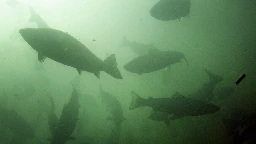More wild Atlantic salmon found in U.S. rivers than any time in the past decade, officials say
More wild Atlantic salmon found in U.S. rivers than any time in the past decade, officials say

More wild Atlantic salmon found in U.S. rivers than any time in the past decade, officials say

cross-posted from: https://lemmy.world/post/4578009
The last wild Atlantic salmon that return to U.S. rivers have had their most productive year in more than a decade, raising hopes they may be weathering myriad ecological threats.
Officials counted more than 1,500 of the salmon in the Penobscot River, which is home to the country’s largest run of Atlantic salmon, Maine state data show. That is the most since 2011 when researchers counted about 2,900 of them.
The salmon were once abundant in American rivers, but factors such as overfishing, loss of habitat and pollution reduced their populations to only a handful of rivers in Maine. The fish are protected by the Endangered Species Act, and sometimes only a few hundred of them return from the ocean to the rivers in a year.
The greater survival of the salmon could be evidence that conservation measures to protect them are paying off, said Sean Ledwin, director of the Maine Department of Marine Resources sea-run fish programs. The count of river herring is also up, and that could be aiding the salmon on their perilous journey from the sea to the river.

